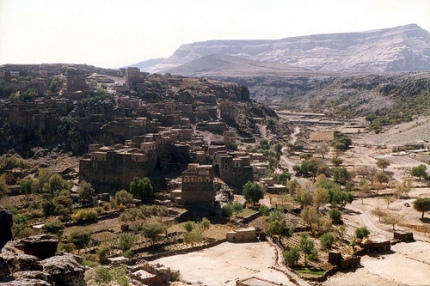Al Qaeda in Arabian Peninsula is Greatest Terror Threat to U.S., Experts Warn
03/02/2011 -The smart, resourceful, and ambitious al Qaeda franchise operating in the fragile state of Yemen is the greatest terrorist threat to the United States, a panel of experts warned lawmakers this morning.
The panel of experts addressing the House Subcommittee on Counterterrorism and Intelligence confirmed National Counterterrorism Center Director Michael Leiter’s recent description of al Qaeda in the Arabian Peninsula (AQAP) as "probably the most significant threat to the U.S. homeland."
Over the last two years, AQAP has been linked to the Fort Hood rampage that killed 13 people, primarily U.S. soldiers, and the failed attacks of the underwear bomb plot of Christmas 2009 and the printer bomb plot of October 2010, both targeting the aviation sector.
“2011 holds great promise for AQAP,” said Barak Barfi, a research fellow at the New America Foundation, describing the advantageous climate the terrorist organization operates in as the beleaguered government of President President Ali Abdullah Saleh fights three major challenges to its rule.
Politically, the Yemeni government is seen as corrupt and unresponsive to its population’s desire for a better life. The Saleh regime is currently battling a Shia rebellion in the north and a secessionist movement in the south as the convulsions spreading throughout the Middle Easthave created a protest movement calling for the end of Saleh’s 32-year reign.
The ancestral home of Osama Bin Laden, Yemen is one of the poorest countries in the Arab world with seemingly intractable problems including a poverty rate of approximately 40 percent, massive unemployment, a bulging youth population, and oil and water shortages. Some analysts predict that the country will run out of oil within ten years, a resource that accounts for a third of the economy, and that Sanaa will be the first capital city in history to run out of water,according to The Council on Foreign Relations.
Christopher Boucek, an associate at the Carnegie Endowment for International Peace, called Saleh’s government “incredibly preoccupied” while Barfi described the rebellion in the north as Saleh’s primary concern.
While the United States and the Saleh regime have partnered to fight AQAP, Saleh is much more concerned with fighting challenges to his rule than he is with the terrorist organization operating in the country’s ungoverned spaces.
The surrounding instability and lack of police or military force projection makes Yemen a perfect place for AQAP to hide out and plan attacks, both Boucek and Barif said.
What makes AQAP more dangerous than core al Qaeda leadership, according to Dr. Jarret Brachman, the managing director of Cronus Global and a former research director at West Point’s Combating Terrorism Center, is its ability to market its message to alienated Muslims in the West using social media and Web publishing.
Since July 2010 AQAP has published an online English-language e-zine called Inspire, which includes call to arms as well as ideas for attacking the West. In its November issue, AQAP boasts that its plot to blow up two air cargo planes was a success even though the bombs were intercepted before they exploded.
"For us, blowing up the planes would have made us very pleased but according to our plan and specified objectives it was only a plus," AQAP's head of foreign operations writes. "[We] determined that if both packages passed through the X-Ray systems at the airport, that would raise a worldwide alert that would force upon the West two choices: You either spend billions of dollars to inspect every package in the world or you do nothing and we keep trying again."
AQAP called its plot “Operation Hemorrhage,” with the cover of the e-zine simply displaying “$4,200,” or the total price of the plot, according to AQAP. Its message is simply: AQAP will bleed the United States dry.
Brachman says AQAP understands their target audience and has turned “jihadism into a game” and made it sexy. He notes that American jihadists--such as Alabama-native Omar Hammami, who fights with the al-Shabaab militia in Somalia, and New Mexico-native Anwar al-Awlaki, who American officials believe plays both a propaganda and operational role in AQAP--have created an idea of “al Qaeda Idol” intended to inspire disaffected young Muslims in the West to take up arms and carry out attacks in their own countries.
AQAP’s message to Western jihadists, said Boucek, is to stay home and mount low-cost, high-return attacks, like shooting up a restaurant in D.C. during the lunch-time rush, rather than traveling to Yemen to train or fight.
According to Barif, AQAP is “shrewd, compact, and [has] shown remarkable resolve.”
While the experts noted that the United States would like to see Saleh stay in power become of his counterterrorism partnership, they also cautioned that the United States cannot be seen as the regime’s puppetmaster.
Brachman said that more the United States talks about its counterterrorism relationship with the Yemeni government, the more the Yemeni public will see the regime as illegitimate. Boucek advised that U.S. counterterrorism assistance to Yemen must be clandestine while Barfi argued direct U.S. military intervention in Yemen would only cause blowback.
Whatever course the United States chooses in Yemen, American policy must balance conflicting priorities, said Boucek. The problem, he said, is how does the U.S. government support Yemeni counterterrorism efforts without supporting a regime that has little if no legitimacy in the Yemeni people's eyes.
